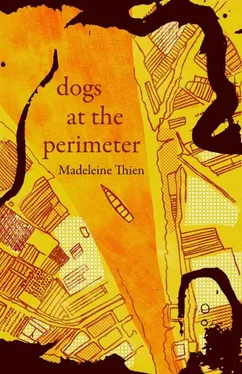“James,” he said.
The man didn’t respond.
“I was told that you were here.”
The man stared past him.
“It’s me, Hiroji.”
He could hear children everywhere, he could hear water boiling, strangely near, persistent voices, it must be the neighbour’s, a door smacking closed, chickens. “Can I come in?” he asked. “Just for a few minutes.”
James pulled the door open a little wider and stepped back. It was cool inside, away from the glare of the sun.
His brother made him tea.
Hiroji said, “I’m a doctor now. I live in Montreal.”
His brother was barely listening. He moved constantly, sipping tea, eating peanuts, standing up to wipe the table, getting ice for the beer, cleaning glasses, misting a baby plant, adjusting the volume of the radio, up, down, lower, then finally moving the radio to a different room entirely without ever switching it off. A woman came out of the room. She was bare foot, wearing a blouse and a blue sampot . When she saw Hiroji, she smiled at him, her eyebrows lifting in a question. James spoke to her in a language he didn’t understand. A few minutes later, the woman, perhaps in her mid-fifties, with a dignified, gracious face, slid her feet into a pair of sandals and left the house.
Hiroji opened his bag and took out an envelope. He removed photocopies of the letters that James had sent to him before he disappeared, a photograph of their family, of his mother’s funeral, of their childhood home in Vancouver. A photograph of James as a child.
James studied them from afar. Then he stood up, set more beer on the table, went into another room, and shut the door behind him.
Hiroji shifted his weight on the flimsy chair. It was okay, he thought. How could you prove to someone that you knew them? How could you prove that you were related by blood and something more than blood? It felt useless. So innate as to be useless. He could leave now. This room would still exist, his brother would still be here, but the cut glass inside himself would no longer pain him. It was finished. Wasn’t that good enough?
He got up and knocked on the closed door.
“Ichiro,” he said. “Don’t you know who I am?”
“Don’t be upset,” his brother said. His voice was muffled. “It’s no use being upset. What’s done is done.”
Something, bitterness or grief, was choking him but nothing came out, no blame, no words. He stood up to leave. When he opened the door, the warm air soothed him, but there were people outside enjoying the evening, there were children beside two oxen, and a girl in a wheelchair with her father behind her. They seemed like impossible obstacles so he went back inside. A little girl followed him through the door. James had emerged, he had already started to clear the table, and the little girl went to James and held his hand.
Hiroji walked past them, to the back of the house. He climbed a staircase and found himself on a sheltered veranda, with a view of the jungle. He felt that he was absurd and out of proportion and his hands were too big for his arms, his neck was too long, his head too heavy. He sat down on the veranda. An ant sidled up his foot and he brushed it lightly away. When he lay back, it was as if he was setting his exhaustion, an infinite misunderstanding, against the floor.
Much later, footsteps sounded. His brother stood over him.
“When did she die?” his brother said, holding a picture of their mother.
“A few years after we lost you. She died of cancer.”
His brother nodded, still staring at the photo. Hiroji was too tired to sit up. He closed his eyes.
“I used to tell myself,” James said, “that my family was living in California, that I should try to reach them. So many children went to America. But how could I get there? I tried to go but … it was difficult. I was afraid.”
Hiroji looked up. “We lived in Vancouver. Don’t you remember? Is that why you never came back?”
“No,” James said. “My family.”
Hiroji said nothing.
“Dararith, my baby boy. My sweet boy. I waited for him, but he never came. I looked everywhere but he couldn’t be found.” He shook his head. “I had to stop searching. In the end, I had to give him up.”
There was a closed room behind Hiroji. James went inside and returned with a full bottle and two dusty glasses. When Hiroji drank the liquor, it burned everything on its cascade down and made the trees spin silently. He emptied the glass quickly, and so did James. His brother poured generously. The stars glistened. On the road outside, Hiroji thought he saw his mother. She was walking through the village. She had come to fetch her coat, and now she wrapped it tight around herself. She told him not to follow her. He felt lost, immaterial. He wanted to shelter the things he loved, to keep them from washing away.
“Say goodbye,” his mother said.
He was running in place, he was afraid to drown, he was afraid to touch land.
“Isn’t this what you wanted?” She looked at him with such intensity, such understanding. “You’ve already come so far. Hold your brother and say goodbye.”
She did up the buttons on her coat and turned away.
[end]
Hiroji travels with me, back through the mountains, eleven hours in a bus with a rattling air conditioner, all the way to the airport in Vientiane. After I fly home to Canada, he’ll go north again, to James. We talk about the brc, about my family, about the things that have changed and not changed since Hiroji went away. Together, we ascend through limestone valleys, we shoulder along hairpin turns. Exhausted vehicles wait in the shade, doors flung open at the side of the highway.
At a rest stop in the mountains, I call Navin. “Where are you?” he asks and I try to find words to describe this place, ivory sky, stilt houses, and children everywhere. A little boy named Pomme is leaning against Hiroji’s legs, watching his mother, who sells mangosteens to the passing travellers. The boy calls us farang Hmong , Westerners with a face like his, strangers both foreign and familiar.
Kiri comes on the line. He says that he is in my old bed, in Lena’s house. He asks me if I still remember it and I say, Yes, I remember.
“We went to the cemetery,” he says. “We put flowers there, for Lena. Lilies.”
The air up here, in the high altitudes, is thin, cooling. Hiroji is kneeling on the ground, talking to the boy, who stares shyly up at the tall trees.
“Dad told me, sometimes when you miss somebody, you lose yourself for a little while.” Between our voices, static, continents. “Promise me,” my son says. “Don’t disappear.”
Between us, cascading mountains, an infinite vista. I make this promise.
In the bus, Hiroji drifts to sleep, his head cushioned by a rolled-up coat. A family across the aisle from us brings out green desserts and the children eat them blissfully. The father sleeps and his wife watches him, her face lined with anxiety and I remember how, long ago, my parents’ lives came apart. One night, Sopham woke from a nightmare and my mother climbed into bed with us. My father came and lit a cigarette and the tiny orange glow held all my attention, burning slowly out. They did not speak to each other. I yearned for their argument to spill over, to explode, to end. One day I came home from school and I saw my father leaning against the kitchen wall, my mother seated at the table, weeping. I heard her accuse him, and my father said nothing. My mother’s face could not be borne. I wanted to go to them, to help them somehow, but it was not possible.
My childhood is full of images like this, passing moments I didn’t understand, as if I were looking through a window into the aftermath of a great event. The school year passed and another began. Sopham and I grew accustomed to our parents’ silence, to the way they withdrew from each other. And then, one night, I saw them sitting side by side, their shoulders touching. Later on, I saw my father caress my mother’s face and between them, once more, was a world I couldn’t enter, full of pathos and history and seeking. What I saw this time was not an aftermath, but a window open to a different way of loving each other. My mother’s longing for my father returns to me. At the end, their lives had grown so intertwined the one could not go on, could not survive, without the other. I had known this from the beginning, from the moment when my father was taken away. From that loss, there had been no return. I try to face the depth of her love. The way she never abandoned us, and how it tore her open.
Читать дальше












